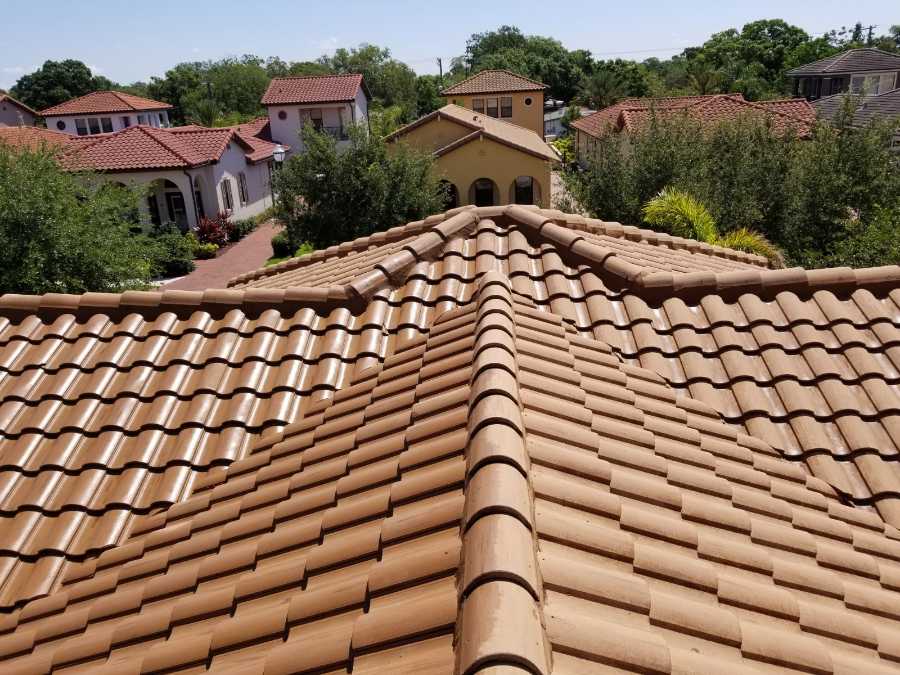|
Throughout the ages, clay tile roofs have been a popular and durable way to protect building structures. The popularity of terracotta tiles as a roofing material has waxed and waned over the centuries, but one thing is for certain, these roofs are popular in Clearwater, Florida. Why is that so? Read on to learn what this type of roof has proven to provide for a building over the centuries.
A Short History of Tile Roofs Historically, clay tiles were hand made throughout the centuries, and later manufactured by machines. Clay tiles on roofs arose independently in several parts of the world including China and the Middle East. From these areas, clay tile roofs spread to Babylon, Egypt and then to Greece and Rome. In the United States, clay tile roofs were common in English settlements in Jamestown, VA and in St. Mary's, MD. Closer to Clearwater the Spanish settlement of St. Augustine, FL also saw clay tiles, as well as many buildings in New Orleans. Throughout the colonial period, many areas of the United States saw the presence of clay tile roofs. One of the reasons for their popularity was the concern about fire. Municipal codes encouraged the use of these roofs because of their fire-retardant abilities. Additionally, builders during these times also favored terracotta because of its durability, ease of maintenance and lack of thermal conductivity. In other words, placing a terracotta roof on one's home helped keep it cool. Even with these positive attributes, terracotta roofs fell out of favor in the United States by the 1830s in many parts of the country. But, like other trends, it eventually returned toward the end of the 19th century with the popularity of Italianate Villa architecture and the construction of row houses and then once again disappeared for a short time. The rise of Spanish, Mediterranean, Mission, Georgian and Renaissance Revival architecture made terracotta roofs a permanent fixture in warmer areas of the United States such as California, Texas and Florida. In addition, the expansion of companies producing machine-made tiles made them more readily available across the nation. Types of Tiles Besides terracotta, tiles made of concrete also came into popularity in the first half of the 20th century. These tiles are made from Portland cement blended with aggregates such as sand and pigment and then extruded from high-pressure machines. Cement tiles remain popular because they mimic the look of terracotta, albeit without color variations and permanence, at a lesser price and weight. In some cases, your tile roof may even be made from a mixture of mineral fiber and cement with pigment added for color. Commonly known as an asbestos roof, these types of tiles require extra care so as not to break them and release the dangerous mineral fiber within into the air. Whether your roof is made of terracotta or some other material, the shape of the tiles usually falls into one of these three categories:
Put Your Tile Roof on a Maintenance Schedule Many times, you'll see tile roofs that are a century or even two centuries old. Their long-lasting quality is another reason why people love them, but that doesn't mean you can just ignore them after construction. Every tile roof should have periodic inspections to look for damaged or broken tiles. If you have purchased an existing home, you should not only know how old the home is but how old the roof is, along with when it last was inspected and cleaned. What Should My Roof Maintenance Schedule Look Like? The beauty of clay roof tiles is that they can easily withstand the wind and rain produced by our Clearwater climate. Roofing experts disagree on how often you should schedule a roof inspection as some say you should have inspections every six months, while others say a year to two years can pass. Whatever interval you're on, have your roof inspected following a severe tropical storm or a hurricane to make sure your roof doesn't have any damage. Of course, cleaning your clay roof through pressure washing is also essential. Before power washing, the professionals at DPI Pressure Washing will inspect your tiles to ensure that all tiles are sound. If we find broken ones, we will recommend that you repair or replace them prior to the job so power washing doesn't cause damage to the underlayment or other structures on your roof, including adjacent tiles. After cleaning, consider sealing your tiles. By doing so, you will not only protect them from dirt clinging to their surface as much but also make them a lot easier to clean. One step that you may not have considered is clearing away debris near your roof. This means cleaning out gutters regularly, which can be done through pressure washing, as well as removing any tree branches that hang too close to your home. Why Terracotta Needs Periodic Roof Cleaning Clay roofs experiences several common problems, which our Clearwater climate exacerbates. First, every roof accumulates bird droppings, which are highly acidic and can cause your tiles to decompose more quickly. However, if you see a lot of bird droppings, make sure that birds aren't nesting there or on a tree above, which can cause additional damage. Clay tiles also easily attract algae, which is already a problem in Clearwater due to our proximity to the Gulf of Mexico. Algae will make the surface of the clay look dark or stained. Decaying leaves often become trapped between the tiles and when that happens, they eventually turn into soil, which in turn can lead to plant or moss growth. Regular power washing will prevent such growth from occurring. Roof cleaning is tricky. You can do tile roof cleaning on your own, but you also have to be careful about how you do it. Our loyal customer, Mary, in St. Petersburg Beach, knew that when cleaning a tile roof, you can't walk on top of the tiles because your feet can easily crack them. Tile is also slippery to walk upon, making the job even more challenging. Even though Mary owns a ranch, she still felt unsure about climbing up on a ladder to clean her roof as she lives by herself. She called us about five years ago to get a quote for roof cleaning and has been a customer ever since. We also regularly clean her gutters. Finding Reliable Roof Cleaning Near Me Take a break from maintaining your property and let DPI Pressure Washing do the work. Our experienced staff will perform a soft power wash on your roof to protect the tiles and get them spotless. Best of all, you'll remain safely on the ground, won't run the risk of getting injured in the process and have more time to do the things you really want. Get your free quote now by filling out our convenient online form or by calling 813-991-7243. Comments are closed.
|
Ella May + Luna Marie + Amelie Rose Munoz:We like to help our Dad to promote his pressure washing and window cleaning business in Clearwater and Tampa Bay. Hope you enjoy this blog ;-). Charlotta Munoz + kids
Categories
All
Archives
June 2024
|
Fully Licensed and Insured - Keep your mind at ease while we work for you.
100% Satisfaction Guaranteed - We never let a customer down!
Affordable and Prompt - We don't like to be late, or expensive.
100% Satisfaction Guaranteed - We never let a customer down!
Affordable and Prompt - We don't like to be late, or expensive.
Serving the Tampa Bay area since 1996!




 RSS Feed
RSS Feed






